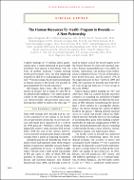| dc.contributor.author | Binagwaho, Agnes | |
| dc.contributor.author | Kyamanywa, Patrick | |
| dc.contributor.author | Farmer, E. Paul | |
| dc.contributor.author | Nuthulaganti, Tej | |
| dc.contributor.author | Umubyeyi, Benoite | |
| dc.contributor.author | Nyemazi, Jean Pierre | |
| dc.contributor.author | Mugeni, Soline Dusabeyesu | |
| dc.contributor.author | Asiimwe, Anita | |
| dc.contributor.author | Ndagijimana, Uzziel | |
| dc.contributor.author | McPherson, Helen Lamphere | |
| dc.contributor.author | Ngirabega, Jean de Dieu | |
| dc.contributor.author | Sliney, Anne | |
| dc.contributor.author | Uwayezu, Agnes | |
| dc.contributor.author | Rusanganwa, Vincent | |
| dc.contributor.author | Wagner, Claire M | |
| dc.contributor.author | Nutt, Cameron T | |
| dc.contributor.author | Eldon-Edington, Mark | |
| dc.contributor.author | Cancedda, Corrado | |
| dc.contributor.author | Magaziner, Ira C | |
| dc.contributor.author | Goosby, Eric | |
| dc.date.accessioned | 2022-04-06T13:02:05Z | |
| dc.date.available | 2022-04-06T13:02:05Z | |
| dc.date.issued | 2013 | |
| dc.identifier.citation | Binagwaho, A., Kyamanywa, P., Farmer, P.E., Nuthulaganti, T., Umubyeyi, B., Nyemazi, J.P., Mugeni, S.D., Asiimwe, A., Ndagijimana, U., Lamphere McPherson, H. and Ngirabega, J.D.D. (2013). The human resources for health program in Rwanda—a new partnership. New England Journal of Medicine, 369(21), pp.2054-2059. | en_US |
| dc.identifier.issn | 0028-4793 | |
| dc.identifier.issn | 1533-4406 | |
| dc.identifier.uri | http://hdl.handle.net/20.500.12280/2913 | |
| dc.description.abstract | The authors discuss the Human Resources for Health Program, which is working to improve the quality and quantity of health professionals in Rwanda by means of sustained collaborations with U.S. schools of medicine, nursing, dentistry, and public health. A global shortage of 4.3 million health professionals poses a major bottleneck to poor people worldwide with regard to benefiting from the fruits of modern medicine.(1) Among existing health professionals, there are also staggering inequities in skill levels and geographic distribution.(2)-(4) Unsurprisingly, the deepest national gaps in human resources for health run parallel to poor population-level health outcomes.(1) Sub-Saharan Africa bears 24% of the global burden of disease(5) but is served by only 4% of the global health workforce.(1) The health graduate schools in the region face overwhelming financial, infrastructural, and personnel constraints, limiting their ability to address the ... | en_US |
| dc.language.iso | en | en_US |
| dc.publisher | Massachusetts Medical Society | en_US |
| dc.relation.ispartofseries | New England Journal of Medicine;369(21) | |
| dc.subject | Human Resources | en_US |
| dc.subject | Health Program | en_US |
| dc.subject | Rwanda | en_US |
| dc.title | The human resources for health program in Rwanda—a new partnership | en_US |
| dc.type | Article | en_US |


